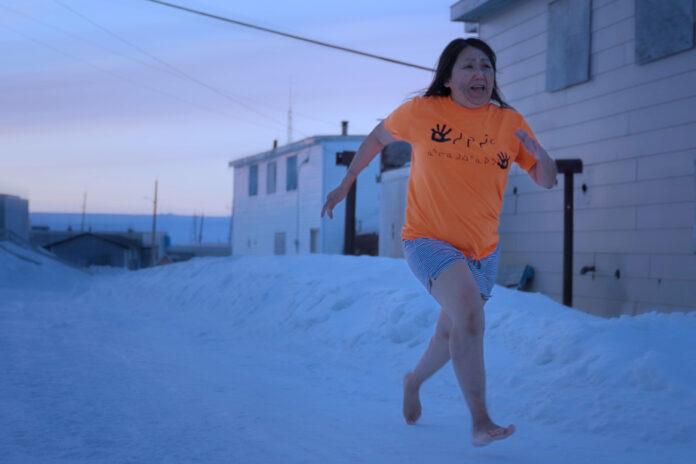Blurring the boundaries between documentary and fiction, Tautuktavuk (Before Our Eyes) offers an intimate and unprecedented foray into the daily lives of two Inuit women, against a backdrop of domestic violence, tradition and the desire for healing. The feature film, which is among the 10 best films of 2023, according to the Toronto International Film Festival (TIFF), arrives in theaters these days.
“It’s clear that it’s fiction, it’s a scripted story, but some of the dialogues are taken from my childhood memories,” explains Lucy Tulugarjuk, co-director of the film, who also plays one of the two women on screen.
As if to further muddy the waters, it is precisely his co-director (Carol Kunnuk) who plays the second woman, his sister in the film, and his cousin in life. Oh yes, and his real aunt also plays her own role here.
You follow ? No matter, the main thing is elsewhere.
It must be understood that the film, rather slow and contemplative, first takes the form of a virtual conversation between the two sisters, one having fled Nunavut for Montreal (Uyarak, played by Lucy Tulugarjuk), the second living in her community in Nunavut (Saqpinak, played by Carol Kunnuk). Pandemic obliges, they exchange thanks to Zoom and, in doing so, gradually reveal themselves on screen. A tender attachment unites them (“I love you, big sister”, “I love you, little sister”), and quietly, Uyarak confides: she has recurring nightmares (it’s the distressing shortness of breath of the gang -ad), and we guess that she was a victim of violence at different stages of her life. She is visibly bruised.
Note that unlike her alter ego, “I have never run barefoot in the snow…”, explains Lucy Tulugarjuk in an interview. The scenario, which will ultimately bring the two women together, is a clever mix of real-life facts and heard stories, we understand half-heartedly.
The film, presented in the original version with English subtitles, is surrounded by splendid images, depicting the immaculate immensity of Nunavut (special mention to the dog sledding scenes), to the sound of soft traditional music. All this raw beauty contrasts with a number of injustices denounced along the way, starting with the blatant lack of resources for people in difficulty. A lack further amplified by a distrust, here rooted in a painful past, explains the director, also general director of the independent television network of Nunavut. “There’s a lack of trust between Inuit and non-Inuit,” she says softly. Because of the way we have been treated historically. Confidence is at its bare minimum,” she lets slip.
Hence the importance of the message of her film, she believes, bringing hope for the future and healing.
“It’s okay to ask for help,” she insists, no longer trying to distance herself from her character. You shouldn’t be ashamed to seek support when you’re going through such hard times. […] And then it’s okay to experience these emotions too. And then it’s okay to forgive. And just as okay to forgive yourself. »
Forgive ? Reflection, which might surprise you, is in fact at the heart of his thinking, undoubtedly of his culture, certainly of his education. “My mother was a very strong woman, you know,” she continues, “and I never heard her complain once. She told me: “Forgiveness is the key to well-being.” »
Note that the film also concludes on a deliberately bright note. “The Inuit have suffered so much in such a short time,” says our interlocutor. Affirming our identity here is also saying: it is okay to be yourself, to have your own customs and your own beliefs, and above all to affirm them. And it is especially correct to affirm them in this era of modernity. »
Lucy Tulugarjuk doesn’t hide it: she hopes that her film will help to debunk certain prejudices, or at least that it will slightly open some closed minds. “I often feel like people are judging me just because of the color of my skin. But I am a human being, she said. So give us space to express ourselves, and perhaps you will understand us a little better. […] People imagine that [I am impaired] and that I live on the streets. But no: I’m not [drunk or drugged]! And on the contrary, I worked really hard to get where I am…” It’s said.








